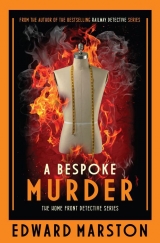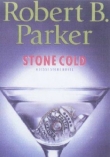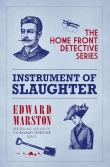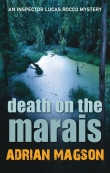
Текст книги "A Bespoke Murder"
Автор книги: Edward Marston
Жанр:
Классические детективы
сообщить о нарушении
Текущая страница: 13 (всего у книги 18 страниц)
CHAPTER SIXTEEN
Irene was halfway back to the house before she realised that she’d forgotten to ask Ernie Gill if he’d followed her when she went to the shops with Miss James. It no longer mattered. Her prime objective had been to find out if he was involved in a murder in Liverpool. Now that he’d convinced her that he was completely innocent of the charge, she chided herself for having suspicions about him. Relieved that he’d not committed a heinous crime, she also absolved him of lying in wait to trail her. Why should he do that? What did he stand to gain? When he could go drinking with friends, he’d have no motive for making such a long journey in the hope of a glimpse of her. Irene had been wrong to suspect him of stalking her and even more wrong to imagine his being capable of murder. When they worked together on the Lusitania, Gill had sometimes played unwelcome pranks but that was the extent of his misdemeanours. She felt thoroughly ashamed at the way that she’d confronted him. It was a poor reward for a man who’d come to her rescue at sea.
When Irene let herself into the house, Dorothy was waiting.
‘Where have you been?’ she asked. ‘I expected you here when I got back. It’s getting dark outside.’
‘I had to go out, Dot.’
‘Have you been shopping again?’
‘No,’ said Irene. ‘I went to see Ernie.’
‘I thought he lived miles away.’
‘He does.’
Dorothy laughed. ‘I think that you’re closer to him than you like to admit, Irene. When will I get to meet this admirer of yours?’
‘How many times must I tell you? Ernie is just a friend.’
‘I wouldn’t go all that way if someone was … just a friend.’
‘It won’t happen again, Dot.’
‘We could have him here for tea one Sunday.’
‘No,’ said Irene. ‘I told you before. He’s not coming here.’
‘But I’d like to meet him. Miss James said that he had a nice voice and was obviously fond of you. Why hide him away?’
‘I wouldn’t want him to get the wrong idea.’
‘Chance would be a fine thing,’ said Dorothy with a sigh. ‘I’d settle for a man getting anysort of idea about me but I don’t seem to interest them. I don’t know why.’
Irene was sympathetic. ‘It may happen one day.’
‘Who’d look at a woman of my age?’
‘They still look at me.’
‘I’m going to die an old maid – just like Miss James.’
‘You’re not at all like Miss James,’ said Irene, hugging her. ‘You hold down a good job and you do just about everything for the church. Don’t keep putting yourself down, Dot. In your own way, you’ve been really successful.’
‘It doesn’t feel like it.’
‘People rely on you. You’re important in their lives.’
‘There is that, I suppose.’
‘I know a way to cheer you up,’ said Irene, heading for the cabinet. ‘Let’s have a glass of sherry, shall we?’
‘The bottle’s almost empty.’
‘That’s why I bought another one when I went shopping.’
Irene took two sherry glasses from the cabinet, then filled one of them from a bottle. There was just enough left in it for the other glass. She handed one to Dorothy and picked up the other.
‘Good health!’ she said.
‘Health, wealth and happiness,’ said Dorothy, taking a sip. ‘I needed that. I feel better already.’
‘Let’s go and sit down.’
‘What about the cooking?’
‘That can wait.’
Irene went into the living room and sat on the sofa. Dorothy chose the armchair opposite her. She saw her sister glancing round.
‘I know what you’re thinking,’ she said. ‘This place is dowdy. It badly needs decorating. I just never got round to it. By the time I’ve got home from work, I’ve run out of steam.’
‘I’m here now, Dot. We’ll do it together.’
‘Unless you get a better offer, that is.’
‘What do you mean?’
‘Well, I’m not persuaded that you’re here for good, Irene. You’re too good a catch. Ernie Gill may not be your choice but I don’t think you’ll be short of offers.’ After another sip of sherry, Dorothy was emboldened. ‘Pass one of them on to me, will you?’
Before he returned to Scotland Yard, Joe Keedy went back to his flat and changed into a different suit and a pair of shoes that fitted. He now felt confident enough to face his colleagues again. Since they teased him about the care he took with his appearance, they would have ribbed him unmercifully if they’d seen him in the clothing borrowed from Harvey Marmion. That had all been given back to the inspector. Keedy was himself again, able to look in a mirror without wincing. Detectives had gathered more information about the raid on Jacob Stein’s shop and Keedy had been given the task of going through all the statements and picking out the most salient. He was poring over his desk when the commissioner came in.
‘I thought you’d have gone home by now, Sergeant,’ said Sir Edward. ‘After your heroic endeavours, you deserve a rest.’
‘I’ve almost finished.’
‘Is there any fresh evidence about the fire at the synagogue?’
‘I’m afraid not, Sir Edward.’
‘There’s another outrage to add to the list, I fear.’
‘Oh – what’s that?’
‘It’s not on the same scale as the others but it’s annoying enough. When he telephoned me, Mr Stone was extremely annoyed.’
‘I would have thought he spent most of his time in a state of annoyance,’ said Keedy, dryly. ‘What’s his complaint this time?’
‘Somebody attacked his car.’
‘When was this?’
‘Earlier this evening,’ said the commissioner. ‘In the time that it was parked outside his brother’s house, two wheels were stolen and the windscreen was smashed. The drive is screened by a thick hedge, apparently, so somebody could slip in there unseen.’
‘Does he have any idea who was behind it?’
‘None at all – he wants youto solve that little mystery.’
Keedy laughed mirthlessly. ‘With respect to Mr Stone,’ he said, ‘we do have other crimes to address. I don’t think you can compare two missing tyres with murder and arson.’
‘He believes the latest incident may be connected to the others.’
Keedy pondered. ‘It’s possible, I daresay, but it was his brother who was the designated victim, not Mr Stone. This could just as easily be the random act of someone who just doesn’t like him. From what I’ve seen of him, I’d say that he has a gift for making enemies.’
‘He does, alas. I fancy that he lists us among them.’
‘Did you tell him about Cochran’s escape from prison, Sir Edward?’
‘I told him how promptly you and Inspector Marmion retrieved the situation. He had the grace to offer a word of praise for you.’
‘Is he going to pass on the news to his niece?’
‘No, Sergeant,’ said the commissioner. ‘He was adamant about that. Miss Stein will not be told. She’d be unnecessarily alarmed. It’s better that she’s kept in ignorance.’
‘I’ll wager she’s been told about her uncle’s motor car.’
‘That’s different. Well,’ said the other, stifling a yawn, ‘I must be on my way and I’d advise you to do the same. I see that the inspector has already gone home.’
‘But he hasn’t, Sir Edward.’
‘Then where is he?’
‘He’s still very much at work.’
‘His office was empty when I walked past.’
‘Inspector Marmion has gone back to Jermyn Street.’
He knew that it was him. Though the man was standing in shadow on the opposite pavement, Marmion was certain that it was none other than Cyril Burridge. He strolled across to him.
‘Good evening, Mr Burridge,’ he said.
‘What are you doing here, Inspector?’
‘I was about to ask the same of you, sir. As for me, I came to take a look inside the shop, now that it’s safe to do so. When the light started to fade, I gave up.’ He nodded towards the shop. ‘It’s much bigger than it seems from the outside.’
‘We needed plenty of storage space.’
‘Is this a nostalgic visit, Mr Burridge?’
The tailor was brusque. ‘I don’t believe in nostalgia.’
‘You must have somehappy memories of working here.’
‘I choose to forget them, Inspector.’
As he looked at him, Marmion wondered how he’d managed to work alongside David Cohen for so many years without any major disagreements. The big, gruff, barely civil Yorkshireman would have been a difficult colleague for anyone, especially so for someone as refined as the manager. With customers, Marmion assumed, Burridge was able to shed his curt manner. The inspector recalled what he’d learnt about the financial affairs of the firm.
‘I can see why you resented Mr Stone.’
‘We all did.’
‘Does that include Mr Cohen?’
‘Ask him.’
‘In effect, I did. He was non-committal.’
Burridge snorted. ‘That’s David Cohen for you!’
‘He praised your work as a tailor.’
‘I’ve never had complaints.’
‘But you were prone to make them, I gather.’
‘Happen.’
Marmion waited for a longer response but he got none. Burridge was prickly and unhelpful. Something must have drawn him back to the site of the tragedy and Marmion refused to believe that the man was entirely without sympathy. Burridge had to be mourning the employer whom he’d claimed to respect when first interviewed. Most of his working life had been spent in Jermyn Street. In spite of what Burridge said, it was bound to weigh with him. He might be free from any hint of sentimentality but he was not heartless. Beneath the bluff exterior, Marmion guessed, the tailor was deeply moved by what had happened to Jacob Stein.
‘How did the two brothers get on?’ asked Marmion.
‘That were their business.’
‘Not if it had an impact on you, and you’ve already admitted that it did. You told me that Mr Stone interfered too much.’
‘I were being polite.’
‘Who made his suits?’
‘His brother had that job.’
‘You were never asked to take over?’
‘I’d have refused, Inspector.’
‘Why is that?’
‘Would youlike to be his tailor?’
‘I can’t say it would be an appealing prospect.’
‘It weren’t.’
‘Do you think he’d be too finicky?’
‘I need to like my clients.’
‘That lets Mr Stone out, then.’
‘Oh, you’re wrong,’ said Burridge, sarcastically. ‘He were my favourite of the two brothers. It’s just that I’d have preferred to measure him for a coffin rather than for a suit. Question answered?’
‘Answered with beguiling honesty,’ said Marmion. ‘While you’re being so candid, sir, perhaps you’d answer this. Why didn’t Jacob Stein stand up to his brother?’
‘I wish I knew.’
‘You must have a theory.’
Burridge smiled. ‘I try to avoid foul language.’
‘Did you know that there’s been another incident related to the family? An attempt was made to burn down the synagogue they attended. What’s your reaction to that?’
‘First I’ve heard of it,’ said Burridge, looking surprised.
‘Are you sorry to hear the news?’
‘What happened?’
‘The fire brigade got there in time to prevent any real damage.’
‘I’m glad to hear that.’
‘Do you have no other comment?’
Burridge hunched his shoulders. ‘No – should I?’
‘Well, it does rather undermine your suggestion that we should take a closer look at Herbert Stone with regard to the events that occurred here. There may be some financial gain once the insurance claim is settled,’ said Marmion, ‘but that’s not proof positive that he was in any way connected with the crimes. And a devout Jew like Mr Stone would hardly set fire to his own synagogue.’
‘True.’
‘So you can cross him off your list of suspects.’
‘I don’t have one, Inspector. You’re the detective.’ He adjusted his hat. ‘My wife will be wondering where I am. I must go.’
‘Answer this before you do, sir. It’s a question that I put to Mr Cohen and he was unable to help me.’
‘Nothing unusual there.’
‘Howard Fine was appointed by Mr Stein then dismissed by his brother. Why?’
‘Ask Mr Stone.’
‘My colleague, Sergeant Keedy, did just that, sir. Mr Stone said that he simply didn’t belong and was causing unease among the rest of the staff.’
‘There’s your answer.’
‘He didn’t explain whyMr Fine didn’t fit in.’
Burridge gave him a shrewd look. Marmion had the feeling that he would not get a reply but he was mistaken. After thinking it over, the tailor eventually spoke, lowering his voice as he did so.
‘Have you metHoward Fine, Inspector?’
‘No,’ said Marmion, ‘he was interviewed by Sergeant Keedy.’
‘And is the sergeant a man of the world?’
‘I’d say that was a fair description of him, sir.’
‘Then I’m surprised he didn’t notice something about Howard. On the other hand,’ Burridge continued, ‘it got past Mr Stein as well. Howard were very good at concealing it.’
‘What are you talking about, Mr Burridge?’
‘Howard Fine talked endlessly about his wife.’
‘Is there any law against that, sir?’
‘No, Inspector. It just seems an odd thing to do when you’re not actually married.’
‘Do you mean that he was just living with a woman?’
‘Howard were not interested in women,’ said Burridge, sourly. ‘Only in men like him.’
Careful not to advertise his destination, Howard Fine asked the taxi driver to drop him off outside a bank. He paid his fare and waited until the taxi had driven away before walking around the corner. Impeccably dressed and carrying a cane, he strolled gently along the pavement until he came to a large house with steps leading up to the front door. He paused to make sure that nobody was watching him then he went up the steps. The door opened before he even reached it. The steward was a dapper individual in his forties.
‘Good evening, Mr Fine,’ he said, standing aside to let his visitor step into the hall. ‘We haven’t seen you for a while, sir.’
‘I had to spend a week or so in London,’ said Fine.
After closing the door, the steward took his hat and cane.
‘We’re glad to have you back in Brighton, sir.’
‘I’m very glad to be back.’
Keedy was startled. ‘Are you telling me what I think you’re telling me?’
‘I’m only reporting what Mr Burridge said to me.’
‘How reliable are hisinstincts?’
‘I don’t think he’d make a mistake about a thing like that.’
‘Then I shouldn’t have done so either.’
‘You weren’t looking for it, Joe,’ said Marmion.
‘There were signs, Harv. I should have spotted them.’
The detectives had met in a pub at the end of an eventful day to share a drink and compare notes. Glad to be back in his own clothing again, Keedy was in a good mood until he was jolted out of it by the news that Marmion had just passed on. He ran a hand through his hair and pursed his lips.
‘That explains why Mr Stone dismissed him,’ he said.
‘Yes, I don’t think he’d have any sympathy for gentlemen of that persuasion,’ said Marmion. ‘I fancy that the actual dismissal would have been nasty, brutish and short.’
‘Then why did Fine have no recriminations about it?’
‘That’s a good question, Joe.’
‘He gave me the impression that he was glad he left and that he’d found a better situation. I got the feeling that he might have enjoyed working in Jermyn Street much more if Cyril Burridge hadn’t constantly bullied him.’
‘Now we know why Burridge acted like that.’
‘Yes, Harv, he doesn’t sound as if he believes in tolerance.’
‘Burridge wouldn’t know the meaning of the word.’
Keedy took a long swig of his beer and smacked his lips.
‘After the day we’vehad,’ he said with feeling, ‘that tastes better than ever. I don’t know how you can drink whisky when there’s beer of this quality to be had.’
Marmion raised his glass. ‘I prefer it, Joe.’
They sipped their drinks and fell into a companionable silence. The pub was frequented by detectives from Scotland Yard and they could see several of their colleagues. Keedy was already close to finishing his first pint but Marmion was nursing his whisky and soda and taking only an occasional taste. It was Keedy who resumed the conversation.
‘So where do we go from here?’ he asked.
‘I would have thought that was obvious.’
‘You want me to interview Mr Fine again?’
‘He needs looking at more closely, Joe. He certainly has cause to bear a grudge against Mr Stone.’
‘Perhaps it was him who removed the wheels on that car.’
‘I doubt that,’ said Marmion. ‘Everything I’ve heard about Howard Fine suggests that he’s not a man to get his hands dirty.’
‘He could have paid someone else to do it.’
‘It seems like a paltry form of revenge.’
‘Not if you’re the owner of the car,’ said Keedy. ‘Mr Stone was livid, apparently. His car is a symbol of his success, Harv. It must have hurt his pride when he saw the damage.’
Marmion seemed to go off into a trance for a while. When he eventually came out of it, he saw that Keedy had finished his drink.
‘My round, I think,’ he said.
‘Tell me what you were thinking first. You were miles away.’
‘Oh, it was nothing.’
‘It was something to do with the case, if I know you.’
‘It was, Joe,’ admitted Marmion. ‘I was just thinking how much easier it would be if it was the otherbrother who was murdered.’
‘Herbert Stone?’
‘Yes – at least we’d have plenty of suspects. Everyone seems to have a motive for killing him. Jacob Stein, however, had no real enemies – or, at least, none that we’ve so far found.’
‘Howard Fine might be a candidate. Then there’s Burridge.’
‘Both will bear closer investigation.’
‘You know what I think, Harv,’ said Keedy. ‘If I was a betting man, I’d put money on one of those anti-Semitic groups.’
‘Have you been sifting through them?’
‘Yes – thanks to your brother. He was very helpful.’
‘Ray gets to see the seamy side of life in his job. And people trust him in a way that they wouldn’t do with the police. If Ray gives you information,’ said Marmion, ‘it’s reliable.’
‘With your permission, I’d like to send some men off to do some sniffing around. It may be possible to infiltrate some of these groups.’
‘Choose them with care, Joe. We don’t have the manpower to cover them all.’ After a long sip of his drink, he rose to his feet and picked up Keedy’s empty tankard. ‘Let me get you another.’
‘Thanks, Harv. Oh, by the way, who won the argument?’
‘What argument?’
‘You remember – the one that you and Ellen had earlier today when we called in at the house. When Alice announced her decision, you took it in your stride. Ellen wasn’t happy about that.’
Marmion chuckled. ‘She certainly wasn’t.’
‘So who won the argument?’
‘I suppose that I did, Joe.’
‘You mean that your wife has accepted the decision now?’
‘No,’ said Marmion, ‘I mean that Ellen came to see that my strategy is best. Now that Alice has made her decision, it’s the worst possible time to tackle her. She’s full of enthusiasm for the idea. Any opposition would only encourage her. Give her a few weeks, however,’ he went on, ‘and she may be more vulnerable to persuasion. There’s a long time to go before the end of term. We must bide our time.’
‘You’re a cunning old fox.’
‘My strategy may not work, of course.’
‘I’m sure it won’t.’
‘What makes you think that?’
‘I had a long talk with Alice earlier on,’ said Keedy. ‘She takes after you, Harv. When she’s set on a course of action, she’ll stick to it, come hell or high water.’
Alice was a voracious reader. She liked nothing better of an evening than to bury her head in a book. Ellen did not interrupt her. Though she was sorely tempted to raise the subject of the Women’s Emergency Corps, she held back on her husband’s advice. While Alice was reading, her mother sat beside her sewing basket and repaired items of clothing. She’d just finished putting a button on Marmion’s trousers when her daughter looked up.
‘Why don’t you say it, Mummy?’
‘Say what?’
‘Come on – I know it’s on the tip of your tongue. I’m surprised you haven’t gone round to Vera’s house and tried to get her parents on your side. If you want to discuss it, speak up.’
‘I’d rather not say anything, Alice,’ her mother told her. ‘We’ve had enough rows about it. It’s time for an armistice.’
‘I couldn’t agree more,’ said Alice with relief. ‘Thank you.’ She saw the trousers. ‘Don’t you think it’s time you taught Daddy to sew on his own buttons?’
‘He’s all fingers and thumbs.’
‘I bet that Joe does all his own sewing.’
‘Is that what he told you?’
‘No – but it stands to reason.’
‘Why?’
‘He lives on his own. Who else would do his running repairs?’
‘What about that lady friend of his?’
‘I don’t think any man would keep a lady friend very long if he expected her to do his sewing. It’s not very romantic. Well,’ said Alice, developing her argument, ‘think back to the time when Daddy was courting you. How would youhave felt if he’d turned up and asked you to darn his socks?’
Ellen laughed. ‘I take your point.’
‘In any case, Joe doesn’t have a lady friend at the moment.’
‘What happened to the nurse?’
‘They came to the parting of the ways.’
‘When did you discover that?’
‘It was while you and Daddy were in the kitchen.’
‘Did Joe simply come out with it?’
‘No,’ said Alice, ‘I sort of drew it out of him.’
Ellen laughed again. Since she’d been a young woman, Alice had brought home a succession of boyfriends but they never seemed to last long. Ironically, it was the ones Ellen liked most who disappeared first. They found Alice too intelligent and assertive. Her mother had long felt that she needed an older man and the name of Joe Keedy had crossed her mind more than once. It was a friendship she’d be ready to condone but she knew that her husband would have objections.
‘You like Joe, don’t you?’ she said.
‘I always have, Mummy.’
‘He obviously likes you.’
‘Oh, I don’t really think I’m his type,’ said Alice. ‘If I had been, something might have happened long before now.’
‘I rather hoped that it would.’
‘You can’t force these things.’
‘Well, at least you have a clear field now.’
‘Mummy!’
‘There’s no need to sound so scandalised, Alice. I’m only being practical. If a man is involved with someone else, then it’s wrong to set your cap at him. When he’s on the loose, however …’
‘I’m not going to chase anyman,’ said Alice, firmly. ‘I never have and I never will. That’s not the sort of person I am. Let’s not discuss it any further. I’ve got my book to read.’
Ellen was repentant. ‘I didn’t mean to upset you.’
Hiding behind her book, Alice wondered why she felt so jangled.
* * *
When she said her prayers that night, Irene asked to be forgiven for entertaining such terrible thoughts about Ernie Gill. He’d always been given to boasting and she should have known not to take his words too literally. She’d placed far too much weight on the fact that the incident in Liverpool had occurred on the very day that he returned there. The whole city was full of people with a rabid dislike and distrust of German immigrants. Many of them had already been on the rampage. It would probably happen again. Why should she assume that Gill was guilty of murder on such slender evidence? It was grossly unfair on him. As she got into bed, she writhed in embarrassment at the memory of her visit to the Three Tuns. It would take a long time for her to live it down.
There was nothing sinister about Gill’s arrival in London. Like many other people, he’d come to the capital in search of work. It was what she’d done herself, after all. While she had a sister to go to, Gill had a friend. Admittedly, Brad Thompson lived in a disreputable area but it was only a temporary arrangement. Once Gill found his feet, he would no doubt move to a better lodging. The question that gnawed away at her was whether or not she wanted to see him again. Irene would certainly avoid him in the short term. She needed time to get over the awkwardness of their latest encounter. Gill had his job as a barber to go to and she’d soon be starting at the toy factory. They’d both be far too preoccupied to enjoy much of a social life.
Meanwhile, she could settle into her new existence. She would soon make new friends at work and enjoy Christian fellowship at church on Sundays. It would be a full and satisfying life, free from the dangers of being torpedoed by enemy submarines. She still had nightmares about the sinking. In her waking hours, however, she kept reminding herself that she’d survived, a blessing bestowed on her for a purpose. That purpose – she felt humiliated to recall it – was most definitely not to make unwarranted accusations against an innocent man. Ernie Gill was her friend. It was time she learnt to trust him.
The car was parked in a yard at the side ofThe car was parked in a yard at the side of the garage. It took them less than a minute to gain entry. Closing the double doors behind them, they loaded the vehicle with combustible materials. The man in the dungarees lit a cigarette, then took several puffs before holding it out to one of h the garage. It took them less than a minute to gain entry. Closing the double doors behind them, they loaded the vehicle with combustible materials. The man in the dungarees lit a cigarette, then took several puffs before holding it out to one of his companions.
‘Here you are, Ernie,’ he said. ‘I think it’s your turn.’








